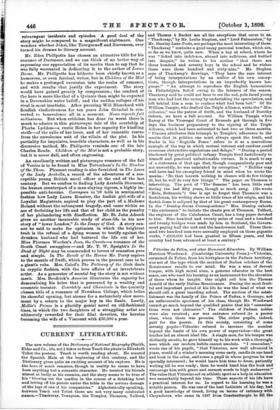CURRENT LITERATURE.
The new volume of the Dictionary of National Biography (Smith, Elder and Co., 15s. net.) takes us from Teach the pirate to Elizabeth 'Billet the poetess. Teach is worth reading about. He scoured the Spanish Main at the beginning of this century, and the Dictionary gives quite an exciting account of his capture. He is the hero of much romance, though in reality he seems to have been anything but a romantic character. He treated his friends almost as badly as his enemies, and the story seems to be true of his "blowing out the candles in the course of a drinking bout and letting off his pistols under the table to the serious damage of the legs of one of his companions." Alphabetically speaking, between Teach and Toilet there are not very many celebrated names,—Thackeray, Tennyson, the Temples, Thomson, Telford, and Thomas k Becket are all the exceptions that occur to us. " Thackeray," by Mr. Leslie Stephen, and " Lord Palmerston," by Mr. Stanley Lane-Poole, are perhaps the most interesting of these. " Thackeray " contains a good many personal touches, which are, so far as we know, quite new. When a boy at school, where he was " licked into indolence, abused into sulkiness, and bullied into despair," he writes to his mother " that there are three hundred and seventy boys in the school and he wishes there were three hundred and sixty-nine." Mr. Stephen says of Thackeray's drawings, " They have the rare interest of being interpretations by an author of his own concep- tions, though interpretations in an imperfectly known lan- guage." " An attempt to reproduce the English humourists in Philadelphia failed owing to the lateness of the season. Thackeray said he could not bear to see the sad, pale-faced young man who had lost the money by undertaking the speculation, and left behind him a sum to replace what had been lost." Of Sir William Temple, who drafted the Triple Alliance, wrote the " Mis- cellanies," was the patron of Swift, and the husband of Dorothy Osborn, we have a full account. Sir William Temple when Envoy at the Viceregal Court of Brussels got through in five days the business preparatory to the signing of the Triple Alliance, which had been estimated to last two or three months. " Flassau attributes this triumph to Temple's adherence to the maxim that in politics one must always speak the truth, and Burke in his `Regicide Peace' refers to it as a marvellous example of the way in which mutual interest and candour could overcome obstructive regulations and delays." " During a period blackened by great political infamy Temple lived fastidiously to himself and practised unfashionable virtues. It is much to say of a statesman of that age that, though comparatively poor and not unworldly, be was untainted by corruption." "Halifax may well have bad his exemplary friend in mind when he wrote the maxim : ' He that leaveth nothing to chance will do few things ill, but he will do very few things.' " The paper on Thomson is interesting. The poet of " The `Seasons " has been little read during the last fifty years, though so much sung. (He wrote "Rule, Britannia.") One is apt to forget that Thomson was a Scotchman, his writing shows so little trace of his origin, and his Scotch fame is eclipsed by that of his great contemporary Burns. In the "Dunlop-Burns Correspondence" Mrs. Dunlop exhorts "the exciseman" to imitate the chaste pen of Thomson. Telford, the engineer of the Caledonian Canal, has a long paper devoted to him. Nine hundred and twenty miles of road and a hundred and twenty bridges were made by him in Scotland, the Govern- ment paying half the cost and the landowners half. Three thou- sand two hundred men were annually employed on these gigantic works, "-£200,000 had been granted in fifteen years, and the country had been advanced at least a century."






































 Previous page
Previous page